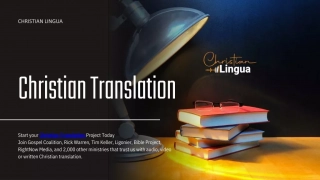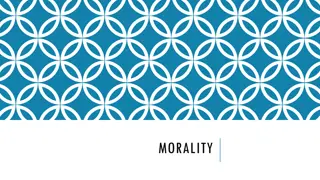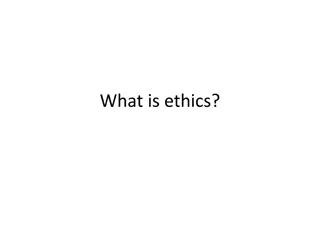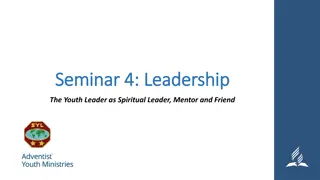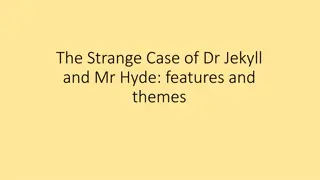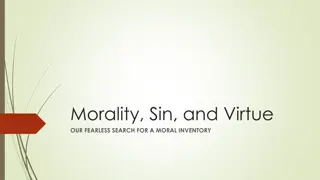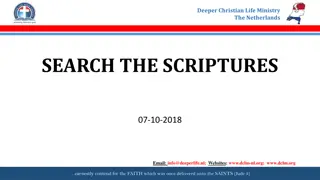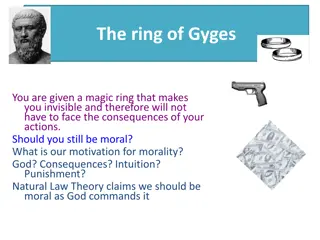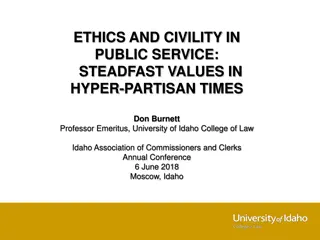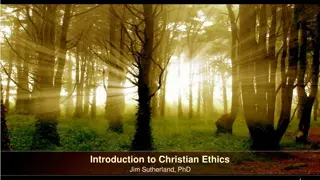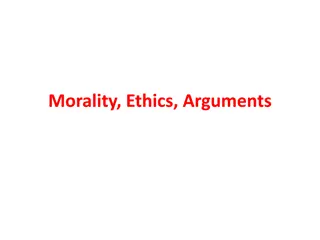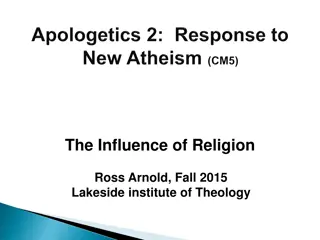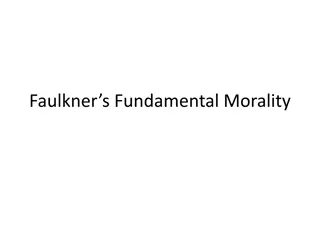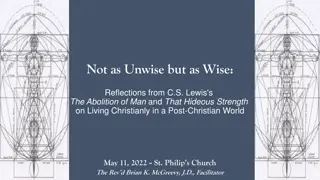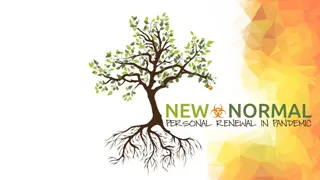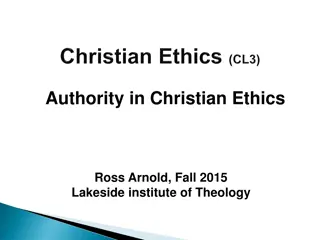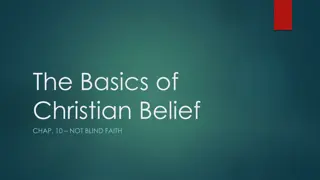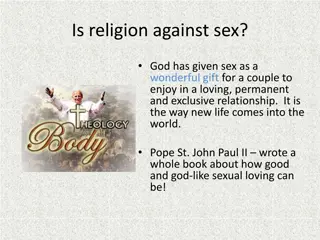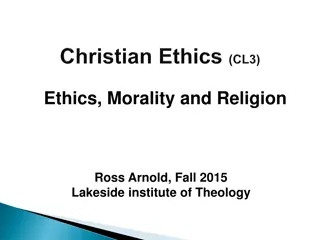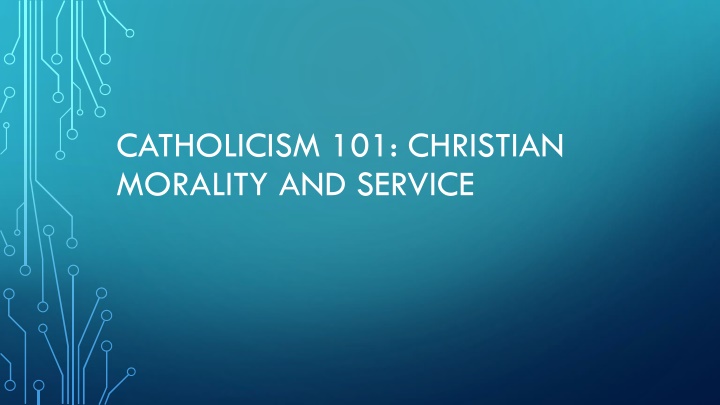
Christian Morality Through the Lens of Freedom - A Catholic Perspective
Explore the concept of Christian morality and freedom within Catholicism. Discover how our fallen human nature, societal influences, and the pursuit of true freedom shape our understanding of virtue and morality. Contrast the modern concept of freedom with the classical view advocated by theologians like St. Thomas Aquinas. Reflect on the roots of modern freedom and the importance of directing our freedom towards God and the good.
Download Presentation

Please find below an Image/Link to download the presentation.
The content on the website is provided AS IS for your information and personal use only. It may not be sold, licensed, or shared on other websites without obtaining consent from the author. If you encounter any issues during the download, it is possible that the publisher has removed the file from their server.
You are allowed to download the files provided on this website for personal or commercial use, subject to the condition that they are used lawfully. All files are the property of their respective owners.
The content on the website is provided AS IS for your information and personal use only. It may not be sold, licensed, or shared on other websites without obtaining consent from the author.
E N D
Presentation Transcript
CATHOLICISM 101: CHRISTIAN MORALITY AND SERVICE
We are children of the one true and living God God knows us better than we know ourselves and He wants only the very best for us Through our baptism and in faith, we are sons and daughters of the living God We are created in God s image WHO ARE WE?
WE HAVE A FALLEN HUMAN NATURE Original sin affects us all Societal influences feed our fallen human nature 1 Jn 2:16 We all struggle with concupiscence the propensity to sin When we lose sight of who we are as children of God and listen to the ways of the world, we are easily drawn into worldly ways
FREEDOM Modern concept of freedom vs freedom in Christ Get what you want, when you want, how you want free to do your will Is this freedom or slavery to our passions? Remember that we are hard-wired for God We were created by God for God and our hearts are restless until they rest in Him Freedom is the power to act or not to act, and so to perform deliberate acts of one s own. Freedom attains perfection in its acts when directed toward God, the sovereign good. The right to exercise freedom, is an inalienable requirement of the dignity of man. But the exercise of freedom does not entail the right to say or do anything. (CCC 1744, 1747)
William of Ockham a Franciscan friar (1287- 1347) developed a concept of freedom of indifference - an individual was free to independently choose between two options The initial choice is influenced by nothing we have no natural inclinations Our actions lack finality Virtue was not important Morality was an obligation Is this true freedom? THE ROOTS OF MODERN FREEDOM
THE CLASSICAL VIEW OF FREEDOM St. Thomas Aquinas (1225-1274) view of freedom: freedom for excellence Freedom is rooted in the soul s natural inclinations A strong link between God and human actions People have a natural disposition toward the virtues Morality results from an attraction toward the good rather than an obligation to do what was good.
Seeks to cultivate and practice virtue Virtue is a habitual and firm disposition to do what is good. It allows the person not only to perform good acts, but to give the best of himself. (CCC 1803) Virtues lead us to freedom based on self- control and toward joy in living a good and moral life THE CHRISTIAN MORAL LIFE
Two types of virtue: theological virtue and cardinal virtue TYPES OF VIRTUE Theological virtues relate directly to God: faith, hope, and charity or love Cardinal virtues: temperance, prudence, justice, and fortitude
THEOLOGICAL VIRTUES Faith we believe in God and all that He said and revealed to us that what the Church proposes for our belief (CCC 1814) Hope we desire heaven and eternal life as our happiness, placing our trust in Christ s promises and relying not on our own strength, but on the hep of grace of the Holy Spirit. (CCC 1817) Love & Charity the virtue by which we love God above all things for His own sake, and our neighbor as ourselves for the love of God (CCC 1822)
CARDINAL VIRTUES Prudence the virtue that disposes practical reason to discern the true good in every circumstance and to choose the right means of achieving it (CCC 1806) 3 parts to prudence: counsel, judgment, & decisiveness Temperance the virtue that moderates the attraction of pleasures and provides balance in the use of material goods (CC 1809) Justice the virtue that enables us to continually give God and neighbor their due (CCC 1807) Fortitude the virtue of courage in difficult times to pursue the common good (CCC 1808)
Jas 1:5 Solomon asked for wisdom (2 Chron 1:7- 12) Wisdom rightly order serves God first, others second, and ourselves last The wisdom of God looks different than the modern concept of wisdom which can be self-serving. James 3:17 WISDOM AND PRUDENCE
Phil 2:3-8 Col 3 ST PAUL'S TEACHING ABOUT A LIFE OF VIRTUE Eph 4:29, 32 1 Thes 5:16-22 Romans 12
Mt 5 the Beatitudes blessed are: Poor in spirit Those who mourn The meek Those who hunger and thirst for righteousness The merciful The pure in heart Those who are persecuted for righteousness sake Blessed are you when men revile you and persecute you and utter all kinds of evil against you falsely on my account JESUS TEACHING ABOUT A VIRTUOUS LIFE
JESUS TEACHING ABOUT SERVICE A life of virtue requires service to God and to others Jn 13:1-15 the washing of the disciples feet Mt 20:26-28 but whoever would be great among you must be your servant, and whoever would e first among you must be your slave; even as the Son of man came not to be served but to serve, and to give His life as a ransom for many.
Matthew chapter 5 John chapter 13 Colossians chapter 3 Romans chapter 12 CCC 1699-1876, 1949-1986, 2030-2557 The Fulfillment of All Desire Ralph Martin Searching for and Maintaining Peace Fr Jacques Philippe FURTHER READING

